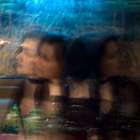PARN Narrative Strategies
The goal of this Symposium is to open up the discussion between academics, artists, designers, writers, makers as well as industry and government parties such as entertainment and production companies, museums and the tourism sector, regarding the content, design principles and aesthetics of these exciting new narrative and entertainment genres.
Maja Kuzmanovic and Nik Gaffney talk about Borrowed Scenery and cultivating an alternate reality:
In the Japanese text "Records of Garden Making" (作庭記, Sakuteiki) attributed to Tachibana Toshitsuna (橘俊綱, 1028-1094 CE) the concept of Borrowed Scenery ("shakkei" in Japanese, "jiejing" in Chinese) was first introduced as way of creating gardens. It is a way of including features from beyond the garden as elements in the garden design. Distant mountains or rivers, clouds, rocks or on occasions even stars can be incorporated. Even though the garden and the surrounding landscape may be topographically separate, 'borrowing' or 'lending' provides a way to experience them as a whole. Stories, myths and metaphors are the cornerstones of these gardens, which can be experienced as tangible phenomena whispering to imagination and memories.
Inspired by shakkei and jiejing gardens, FoAM developed a multi-sensory narrative "Borrowed Scenery" a story without a narrator or explicit narration which unfolded through hints and immersive ambiance. By 'borrowing' from sources as diverse as myths about plants, patabotany, plant sciences, historical mysteries and the setting of the everyday, Borrowed Scenery became a story about an alternate reality (past, future or parallel) where plants are a central aspect of human society. Weaving through the physical spaces of everyday life, the story could be tangibly experienced wherever plants and humans interact. Borrowed Scenery encourages us to see urban plant life with fresh eyes and re-imagine our cities as places of sinuous interaction between humans and plants: where plants provide us with more than just food and materials, they become neighbours, teachers, and gateways to the planetary "Other".
http://physicalnarration.org/content/narrative-strategies-2012




